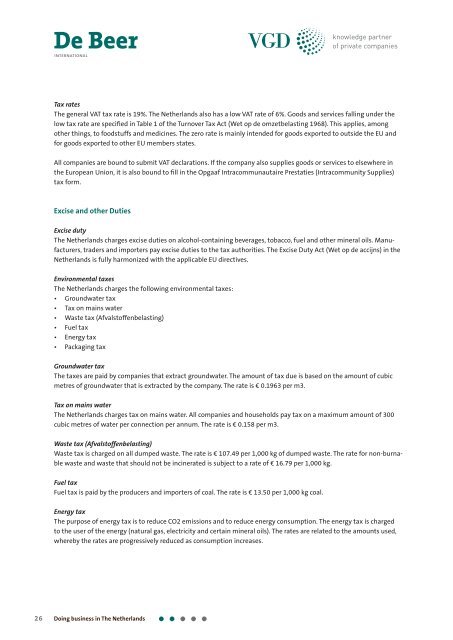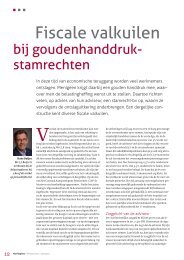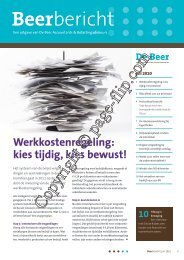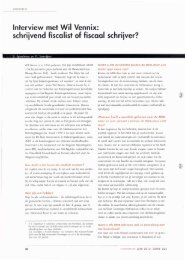De Beer
De Beer
De Beer
- No tags were found...
Create successful ePaper yourself
Turn your PDF publications into a flip-book with our unique Google optimized e-Paper software.
<strong>De</strong> <strong>Beer</strong>INTERNATIONALknowledge partnerof private companiesTax ratesThe general VAT tax rate is 19%. The Netherlands also has a low VAT rate of 6%. Goods and services falling under thelow tax rate are specified in Table 1 of the Turnover Tax Act (Wet op de omzetbelasting 1968). This applies, amongother things, to foodstuffs and medicines. The zero rate is mainly intended for goods exported to outside the EU andfor goods exported to other EU members states.All companies are bound to submit VAT declarations. If the company also supplies goods or services to elsewhere inthe European Union, it is also bound to fill in the Opgaaf Intracommunautaire Prestaties (Intracommunity Supplies)tax form.Excise and other DutiesExcise dutyThe Netherlands charges excise duties on alcohol-containing beverages, tobacco, fuel and other mineral oils. Manufacturers,traders and importers pay excise duties to the tax authorities. The Excise Duty Act (Wet op de accijns) in theNetherlands is fully harmonized with the applicable EU directives.Environmental taxesThe Netherlands charges the following environmental taxes:• Groundwater tax• Tax on mains water• Waste tax (Afvalstoffenbelasting)• Fuel tax• Energy tax• Packaging taxGroundwater taxThe taxes are paid by companies that extract groundwater. The amount of tax due is based on the amount of cubicmetres of groundwater that is extracted by the company. The rate is € 0.1963 per m3.Tax on mains waterThe Netherlands charges tax on mains water. All companies and households pay tax on a maximum amount of 300cubic metres of water per connection per annum. The rate is € 0.158 per m3.Waste tax (Afvalstoffenbelasting)Waste tax is charged on all dumped waste. The rate is € 107.49 per 1,000 kg of dumped waste. The rate for non-burnablewaste and waste that should not be incinerated is subject to a rate of € 16.79 per 1,000 kg.Fuel taxFuel tax is paid by the producers and importers of coal. The rate is € 13.50 per 1,000 kg coal.Energy taxThe purpose of energy tax is to reduce CO2 emissions and to reduce energy consumption. The energy tax is chargedto the user of the energy (natural gas, electricity and certain mineral oils). The rates are related to the amounts used,whereby the rates are progressively reduced as consumption increases.26 Doing business in The Netherlands







